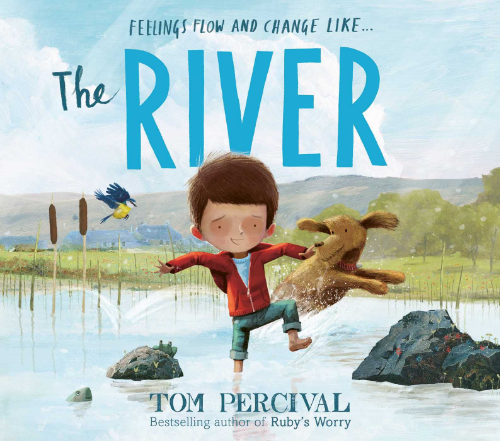A new Tom Percival book is always eagerly anticipated at Little Parachutes. It is certain to contain many helpful messages for children to hold close to their hearts as they negotiate the peaks and troughs of growing up. He truly understands and is in touch with their emotions, acknowledging them respectfully without preaching or grown up rationalisation, holding a mirror up to them in the most exquisitely beautiful and natural way.
In The River, we meet a boy called Rowan who loves exploring the countryside with his dog. The river that flows through the story provides a metaphor for the boy’s ever-changing emotions: it is sometimes quiet and calm, sometimes light and playful, and at other times wild and angry, just like Rowan. Then one particularly cruel winter, Rowan’s beloved dog dies, and he descends into a deep and inescapable sadness (reflected in the story by the river freezing over). The love and support of his parents and the warm spring and summer sunshine fail to melt the ice, and it’s not until the autumn, and the arrival of an injured bird to care for, that Rowan’s heart begins to thaw and heal. As the bird recovers and is able to fly freely, once again the river flows and Rowan realises how much his emotions are like the river: constantly changing.
The narrative flows equally through both words and pictures with many poignant details, such as the death of Atlas the dog, shown in illustration only. The author’s love of the countryside shines through in the stunning natural panoramas in a palette of colours similar to a Constable landscape.
 A beautiful, hopeful picture book that supports and acknowledges children struggling with complex emotions. The boy in the story experiences (and recovers from) a prolonged period of sadness following the death of his pet dog, but the themes in the story would be useful for many scenarios.
A beautiful, hopeful picture book that supports and acknowledges children struggling with complex emotions. The boy in the story experiences (and recovers from) a prolonged period of sadness following the death of his pet dog, but the themes in the story would be useful for many scenarios. 
